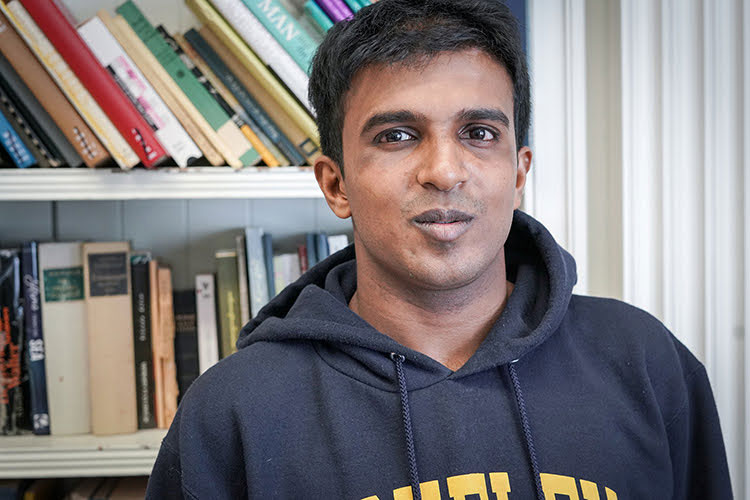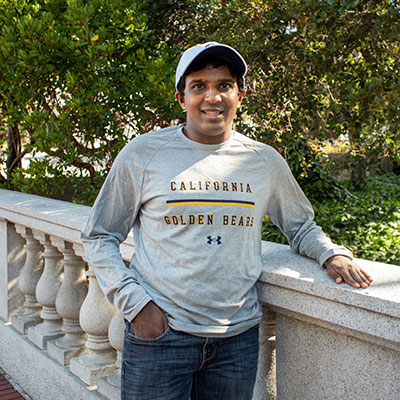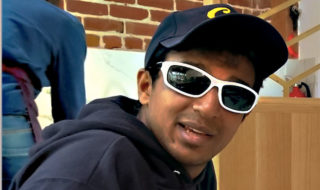‘Minimally speaking autistic’ student wins Soros fellowship for Ph.D.
Psychology major is first student with oral-motor apraxia to win prestigious award
April 14, 2022

Hari Srinivasan, a senior graduating in psychology who describes himself as a “minimally speaking autistic,” has won a Paul & Daisy Soros Fellowship for New Americans. (UC Berkeley Library photo by Jami Smith)
You can hear Hari Srinivasan’s confident voice in his academic research papers, his Daily Californian newspaper articles and in his poetry and essays. But in person, you’re not likely to hear him speak.
That’s because the UC Berkeley psychology major’s ability to vocalize is severely limited due to regressive autism and a neurological disorder known as oral-motor apraxia.
It closed many doors to him. But not at Berkeley, and certainly not now.
Srinivasan is the first nonspeaking person, or as he puts it, “minimally speaking autistic” to win a prestigious Paul & Daisy Soros Fellowship for New Americans. He will receive $90,000 to fund his Ph.D. studies in neuroscience at Vanderbilt University in Tennessee.
Along with Dave Epstein, a Ph.D. student in computer science at UC Berkeley, Srinivasan is among 30 erudite U.S. undergraduate and graduate students selected this year for the 1998-founded fellowship. The honor recognizes immigrants and children of immigrants “who are poised to make significant contributions to U.S. society, culture or their academic field.”
One of many firsts
For Srinivasan, who is minoring in disability studies, the fellowship is one of many firsts that defy all those who told him that college, much less a doctoral program, was beyond his capabilities.
“All over the U.S., there are but a handful of autistics with communication challenges like me in higher ed, let alone at a top university like Cal,” he wrote in an email interview. “My challenges are so significant that I even don’t have the option of choosing to not disclose my disability. It’s just too obvious.”
“This is a community where everyone knows everyone. The number who made it to college before me I can count on the fingers of one hand,” he added. “So, when I say I’m a first, especially in a Ph.D. program, that is literally true.”
A native of Cupertino, California, and the child of immigrants from India, Srinivasan was diagnosed with autism and ADHD at age 3. Through unwavering parental support, sheer smarts and determination, he has beat the odds every step of the way.
On the autism spectrum, Srinivasan is classified as nonspeaking, or minimally speaking, due to severe apraxia, which impacts the fine motor skills needed for speech, handwriting and other activities.
“I use the ‘minimally speaking’ label because I can actually speak a dozen words and phrases around very basic wants like water and sleep, and I can sing a few things, but need to use alternative modes of communication for anything beyond, including conversations,” he wrote.
Srinivasan’s fellowship is being celebrated across UC Berkeley’s top-ranking psychology department, where he has worked alongside such luminaries as professors Dacher Keltner, Stephen Hinshaw and Rodolfo Mendoza-Denton.
“Hari is a transcendent human being, beyond words in his talents, intellect, kindness, understanding and what he will do, and is doing, for our world,” said Keltner, a leading scholar in the science of emotions.
Against ‘formidable odds’
As a Haas Scholar, Srinivasan has conducted research on emotions, among other scholarly pursuits, and will graduate Phi Beta Kappa and Psi Chi. Beyond the campus, he has served on the Interagency Autism Coordinating Committee of the National Institutes of Health, which advises federal policy around autism, and on the boards of several national advocacy nonprofits.
“Hari has embraced his Berkeley experience to the very fullest in the classroom, research laboratory, on campus and more broadly,” said UC Berkeley psychology chair Serena Chen. “Along the way, he has touched so many people — fellow students, staff and faculty alike — and has achieved so much against formidable odds, to boot.”
As a lively toddler in an affluent school district in Cupertino, Srinivasan was expected to thrive academically and socially. But when he missed critical developmental milestones, his immigrant parents found themselves navigating not just cultural challenges, but also stigmatization and a labyrinthine disability and special education bureaucracy.
What followed was a series of low-expectation classrooms all the way to middle school.
“They were environments in which being allowed to exist in the same space as non-disabled kids in a noisy playground at recess or lunchtime was termed sufficient mainstreaming,” he wrote.
That changed when he entered the California Virtual Academy@San Mateo, a charter school that offered a mainstream education through alternative learning technologies. Srinivasan thrived, winning awards for creative writing and poetry, and was named high school valedictorian.
At the same time, programs that supported people with disabilities questioned his desire for higher education.
Berkeley mentors galore
After earning an associate in arts degree in psychology from San Jose City College, he was accepted to UC Berkeley’s undergraduate psychology program, where he found many mentors and a study focus.
“My work is based on the seminal work on the emotion of awe by professor Dacher Keltner, so it’s been ‘awesome,’ pun intended, to research awe with him as my mentor,” he wrote.
Meanwhile, as a senior writer for the Daily Californian student newspaper, Srinivasan has written more than 50 articles, many of which delve into disability issues and the stigma attached to mental disorders.
He has also taught courses on autism in the Democratic Education at Cal (DeCal) program under the faculty sponsorship of Stephen Hinshaw, a psychology professor who specializes in the study of ADHD, psychopathologies and the stigma of mental illness.
Srinivasan was also welcomed into the UC Berkeley Disability Lab’s makerspace, even though his motor skills were unable to handle most of the tasks involved. Karen Nakamura, an anthropology professor who heads up the lab, made sure to include him by playing to his strengths and putting him in charge of “team propaganda.”

Photo courtesy of Hari Srinivasan.
“No one at UC Berkeley ever said ‘no,’ whether it was faculty or my peers or other staff,” he wrote. “They let me explore and try different things. It was like neurotransmitters were just free flowing in this autism mind.”
As for winning the Paul & Daisy Soros Fellowship for New Americans, he wrote that he owes much to his family’s steadfast support, Indian cultural roots and innovative technology for securing his place at a top research university.
“Like my dad says, I’ve raised the bar higher for everyone now, to aim not just for undergrad but also grad school and even a doctoral degree,” he wrote. “Right now, everyone at home is calling me (Dr.) Hari, the parenthesis to be removed once I finish. I am cautiously optimistic that I will reach that finish line.”
SEE MORE
